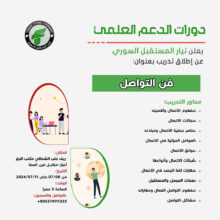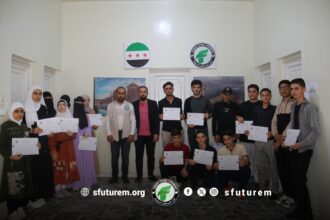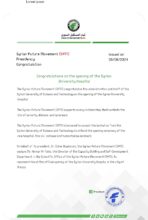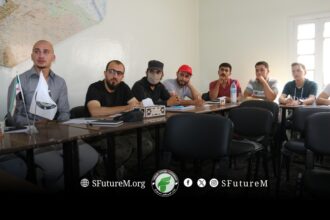Corruption and Nepotism in Syria

Introduction:
Corruption and nepotism are deeply rooted phenomena in many societies, raising profound philosophical questions about human nature, the relationship to authority, and ethical values.
The philosophical dimensions of corruption and nepotism include questions about human nature: Are these issues a reflection of fundamental human tendencies? Is humankind inherently self-serving, drawn to power and wealth, or are these behaviors merely products of a corrupt environment that fosters such actions?
Additionally, there is the question of the social contract: How do corruption and nepotism conflict with the concept of a social contract, which ideally promotes cooperation and solidarity among members of society?
Is it possible for a society to be just and prosperous in the face of widespread corruption?
Ethics and values are also called into question: Which moral values are undermined by corruption and nepotism? Do societies suffering from these issues lose their moral foundations, transforming into purely materialistic communities?
The question of authority and responsibility arises as well: How does power influence individual behavior? Does it make some more prone to corruption and favoritism? And what ethical responsibility does a ruler hold?
Lastly, the question of social justice: How do corruption and nepotism impact the realization of social justice?
Is fair distribution of wealth and power achievable in the presence of these issues?
Aristotle connected corruption with poor governance, viewing a corrupt ruler as one who places personal gain above the welfare of the state and its people.
In his “Republic,” Plato offered an ideal vision of a just state, governed by wise philosophers characterized by virtue and rationality.
Max Weber associated bureaucracy with corruption, arguing that it could foster corruption without sufficient oversight.
All of this underscores the critical need to examine corruption and nepotism as dangerous societal viruses.
Dangers and Drawbacks
Corruption and nepotism represent a pervasive affliction in Syrian society, a problem that has significantly worsened in recent years due to the Syrian crisis.
The effects of this phenomenon extend beyond the economic scope to encompass political, social, and ethical dimensions, threatening to undermine the foundations of the state and society. We will examine this issue through the following dimensions:
- Political Dimensions of Corruption:
- A. Erosion of Trust in the System: Corruption erodes trust in the political system, leading to increased social divisions and weakening social cohesion.
- B. Reinforcement of Authoritarianism: Corruption is often used as a tool to strengthen authoritarianism and maintain power, with benefits and resources distributed to those close to the authorities.
- C. Obstruction of Reform: Corruption poses a significant barrier to any political and economic reform processes, as those who benefit from the current situation resist any change.
- D. Facilitation of Foreign Interference: Corruption is exploited by external forces to interfere in Syria’s internal affairs, complicating the crisis further.
- Social Dimensions of Corruption:
- A. Increase in Poverty and Unemployment: Corruption contributes to rising poverty and unemployment, as wealth and resources are distributed inequitably.
- B. Deterioration of Public Services: Corruption leads to the deterioration of public services, such as health, education, water, and electricity, negatively impacting citizens’ lives.
- C. Increase in Emigration: Corruption drives many young people to emigrate in search of better job opportunities and a dignified life.
- D. Family and Community Breakdown: Corruption causes family and community breakdown, leading to the spread of crime and violence.
- Ethical Dimensions of Corruption:
- A. Decline in Ethical Values: Corruption fosters the decline of ethical values, such as honesty, integrity, and justice.
- B. Spread of Lies and Deception: Lying and deception become tools to achieve objectives, leading to a breakdown of trust among individuals.
- C. Weakening of National Spirit: Corruption weakens the national spirit, as individuals become more focused on personal interests at the expense of the nation’s welfare.
- Financial Dimension:
- A. Worsening the Syrian Crisis: Corruption deepens the Syrian crisis and delays the resolution process.
- B. Obstruction of Reconstruction Efforts: Corruption poses a major obstacle to reconstruction and development efforts in Syria.
- C. Threat to Stability: Corruption threatens stability and security in Syria, potentially igniting new conflicts.
It is important to note that corruption is a complex phenomenon influenced by multiple factors. Therefore, more studies and research are needed to assess the extent of corruption in Syria and its impact on various sectors, which this paper aims to highlight.
Corruption in Syrian Regime-Controlled Areas:
Corruption in areas under the control of the Syrian regime is a pervasive illness that threatens the foundations of the state and society, presenting a major obstacle to any process of reform or reconstruction.
This phenomenon has significantly worsened in recent years, becoming one of the primary reasons for the deterioration of living and economic conditions in the country.
Key Forms of Corruption in Regime-Controlled Areas:
- Bribery and Nepotism: Bribery and nepotism are among the most common forms of corruption, where obtaining any government service often requires paying bribes to officials.
- Embezzlement and Theft: Syria’s public sector has witnessed widespread embezzlement and theft of public funds, further aggravating the economic crisis.
- Smuggling of Goods: Large quantities of essential goods and fuel are smuggled out of the country, leading to increased prices and scarcity within Syria.
- Real Estate Corruption: The real estate sector in Syria is rife with corruption, involving the seizure of public lands and their sale at reduced prices to individuals close to the regime.
- Corruption in Relief Projects: Humanitarian aid to Syria is often exploited for personal gain, depriving those in need. Notably, over half of the aid following the recent earthquake was reportedly stolen.
The reasons for the spread of corruption may be attributed to:
- Absence of the rule of law: The weakness of the rule of law and the lack of effective mechanisms to hold the corrupt accountable encourage the spread of this phenomenon.
- Concentration of power: Concentrating power in the hands of one person or a small group leads to weak oversight and ease of committing corruption.
- Economic crisis: The economic crisis that Syria is suffering from has exacerbated corruption, as officials resort to bribery and favoritism to secure additional sources of income.
- Lack of transparency: The lack of transparency in the work of government institutions facilitates corruption and makes it difficult to detect and hold perpetrators accountable.
Thus, the impact of corruption on Syrian society in regime-controlled areas is represented in the deterioration of public services such as health, education, water, and electricity.
And an increase in poverty and unemployment, as wealth is distributed unfairly.
In addition to the erosion of trust in the state and its institutions, which increases social divisions.
And the encouragement of violence, as the corrupt compete for influence and wealth. According to the Harmoon Center for Contemporary Studies, corruption in Syria includes various political, economic, social, and educational sectors.
Corruption is represented by the abuse of power to achieve personal benefits in illegal ways, which leads to wide-ranging social and moral harm.
And thus, the impact of corruption on Syrian society in regime-controlled areas is represented in the deterioration of public services such as health, education, water, and electricity.
And an increase in poverty and unemployment, where wealth is distributed unfairly.
In addition to the erosion of trust in the state and its institutions, which increases social divisions.
And the encouragement of violence, as the corrupt compete for influence and wealth. According to the Harmoon Center for Contemporary Studies, corruption in Syria includes various political, economic, social, and educational sectors.
Corruption is represented by the abuse of power to achieve personal benefits in illegal ways, leading to wide-ranging social and moral harm.
Studies indicate that corruption in Syria has not decreased after the revolution; instead, it has become more complex with the emergence of warlords who have expanded the base of corruption to include new members in this corrupt system.
Corruption in the areas of Hay’at Tahrir al-Sham:
The spread of corruption and favoritism in the areas controlled by the Salvation Government and Hay’at Tahrir al-Sham in Idlib poses a significant challenge that hinders reconstruction efforts and negatively impacts the lives of civilians. Despite the ongoing conflict in these areas, corruption has infiltrated and now represents an additional obstacle to achieving stability.
Main manifestations of corruption and favoritism in Idlib:
- Bribery: Widespread bribery for obtaining government services, such as building and trade permits, and even government jobs, similar to the common practice before the revolution in Syria.
- Favoritism in appointments: Appointing individuals close to leadership in government positions, regardless of their competence or experience.
- Property seizure: Numerous cases of seizing private and public properties, either directly or by falsely accusing the owners.
- Material smuggling: Smuggling essential materials and fuel to other areas, leading to higher prices and scarcity in local markets.
- Corruption in relief projects: Exploiting humanitarian aid provided to the area for personal gain, rather than distributing it to those in need.
The spread of corruption in HTS-controlled areas can be attributed to the weakness of the rule of law and the lack of effective mechanisms to hold the corrupt accountable, which encourages this phenomenon. The concentration of power in the hands of a limited group of individuals increases the chances of corruption. Additionally, the lack of transparency in government institutions’ operations facilitates corruption and makes it difficult to detect and hold perpetrators accountable.
Corruption in Areas Controlled by the Interim Government and the National Army:
The spread of corruption in areas under the control of the Interim Government and the National Army in northern Syria poses a significant challenge, hindering reconstruction efforts and negatively impacting civilians’ lives. Despite the security and economic challenges facing these regions, corruption has permeated various aspects, creating an additional obstacle to achieving stability.
Main manifestations of corruption:
- Bribery and favoritism: Bribery and favoritism are among the most common forms of corruption, with obtaining government services often requiring bribes to officials. Additionally, appointments and promotions are frequently granted to those close to decision-makers.
- Property seizure: Numerous cases of seizing private and public properties, either directly or by imposing false accusations on their owners.
- Material smuggling: Smuggling essential goods and fuel to other areas, resulting in higher prices and scarcity in local markets.
- Corruption in relief projects: Exploitation of humanitarian aid provided to the region for personal gain, rather than distributing it to those in need.
- Administrative and financial corruption: Many instances of administrative and financial corruption exist within government institutions, including budget manipulation and public fund embezzlement.
- These issues have led to a deterioration in public services such as health, education, water, and electricity, as well as an increase in poverty and unemployment due to the unequal distribution of wealth. Additionally, they have eroded trust in local authorities, exacerbating social divisions and presenting a major barrier to reconstruction and development in the region.
- Judiciary and favoritism: The judiciary in these areas suffers from the intervention of armed factions, resulting in weak enforcement of judgments and the spread of favoritism. Reports indicate the appointment of unqualified judges under pressure from factions, undermining confidence in the judicial system.
- Economic monopoly: Armed faction leaders exploit their influence to control profitable economic sectors, leading to a monopoly on resources and the marginalization of traders and industrialists lacking military support.
Corruption and Favoritism in SDF-Controlled Areas:
The issue of corruption and favoritism in areas controlled by the Syrian Democratic Forces (SDF) is one of the complex issues that significantly affect civilians’ lives and hinder reconstruction and stabilization efforts, similar to the aforementioned regions. Despite the important role played by the SDF in fighting the Islamic State, criticism is growing regarding the spread of corruption in its areas of influence.
The Current Reality of Corruption in SDF-Controlled Areas:
- Lack of Accurate Data: It is difficult to obtain accurate statistics on the extent of corruption in SDF-controlled areas due to the absence of a transparent system for data collection and performance evaluation. However, many reports and investigations indicate the widespread presence of corruption in various sectors, a statement that applies to other regions as well.
- Manifestations of Corruption: Corruption in SDF-controlled areas includes bribery and favoritism in obtaining government services, property seizures, smuggling of goods, corruption in relief projects, and administrative and financial corruption.
- Impact of Corruption: Corruption leads to the deterioration of public services, increased poverty and unemployment, erosion of trust in authorities, escalation of conflict, and obstruction of the reconstruction process.
There is a significant similarity between the areas controlled by the SDF and those controlled by the Government of Salvation regarding favoritism and corruption.
What is worth noting for all areas under de facto authority:
- Reports from Human Rights Organizations: Many reports issued by human rights organizations indicate the presence of widespread corruption in all four regions, documenting numerous cases.
- Eyewitness Testimonies: Many civilians have provided testimonies about their experiences with corruption, confirming the spread of this phenomenon.
- Journalistic Investigations: Many media outlets have conducted investigations revealing several instances of corruption.
Challenges in Combating Corruption:
The tense security situation in the region affects efforts to combat corruption, as it makes it difficult to implement necessary reforms. Additionally, the heavy reliance on external aid makes it challenging for de facto authorities to implement comprehensive reforms to fight corruption, for fear of losing support.
Conclusion:
Corruption and favoritism represent a significant challenge facing Syrian society, and this problem has greatly worsened due to the Syrian crisis. To combat this phenomenon, a set of recommendations can be applied at the national level and within civil society:
- At the national level, we recommend the following from the Syrian Future Movement’s Scientific Office:
- Building Strong and Transparent Institutions: Strong and transparent institutions capable of combating corruption should be established, such as an independent anti-corruption authority with broad powers.
- Implementing a Law to Punish Corrupt Individuals: Strict laws should be enacted to punish corrupt individuals at all levels and ensure the recovery of embezzled funds.
- Enhancing Transparency: Transparency in the operations of government institutions must be enhanced, with regular publication of financial information and government projects.
- Combating Smuggling: Smuggling of essential goods and fuel should be combated, with strict measures at the borders to prevent it.
- Developing an Independent Judicial System: An independent and impartial judicial system capable of prosecuting corrupt individuals and issuing fair judgments should be developed.
- Strengthening Public Oversight: Public participation in monitoring officials’ performance should be encouraged, and secure channels for reporting corruption should be provided.
- Combating Money Laundering and Terrorism Financing: Strict measures should be taken to combat money laundering and terrorism financing, as these two crimes are closely linked to corruption.
- Developing Digital Infrastructure: Digitization can contribute to increasing transparency and reducing corruption by adopting electronic systems in government procedures.
- At the civil society level, we recommend:
- Raising Public Awareness: The public must be educated about the dangers and negative effects of corruption, and the values of integrity and transparency should be promoted.
- Supporting Civil Society Organizations: Civil society organizations working in the field of anti-corruption should be supported, including providing financial and logistical support.
- Developing Awareness Programs for Youth: Awareness programs for youth should be developed regarding the importance of integrity and combating corruption, and promoting a culture of community participation.
- Establishing Hotlines for Reporting Corruption: Safe hotlines should be established for reporting corruption cases, ensuring confidentiality for whistleblowers.
- At the level of northern Syria, in addition to the previous recommendations, there are specific recommendations for northern Syria:
- Applying Principles of Good Governance: The principles of good governance should be applied in local administrations, including transparency, accountability, and participation.
- Enhancing Cooperation Among Factions: Cooperation among armed factions in northern Syria should be enhanced to combat corruption, and efforts should be unified in this regard.
- Providing International Support: The international community should provide necessary support to the liberated areas in Syria, including financial and technical support to combat corruption.
In conclusion, combating corruption is a long-term process that requires the combined efforts of all parties, whether governmental, societal, or international. There must also be a genuine political will to fight this phenomenon, with decisive measures taken to hold the corrupt accountable.
Scientific Office
Research Team
Research and Studies Department
Syrian Future Movement
References:
- Northern Syria Courts… The Judiciary, a Victim of Corruption and Threats.
- The Judicial System in the Areas Controlled by the Syrian Interim Government.
- Wings of Syrian Corruption – Harmoon Center for Contemporary Studies.
- The Syrian Economy… From Corruption Princes to War Lords.
- The Corruption System in the Institutions of the Assad Regime… Manifestations and Impacts.
- The Corruption System in the Institutions of the Assad Regime… Manifestations and Impacts.






